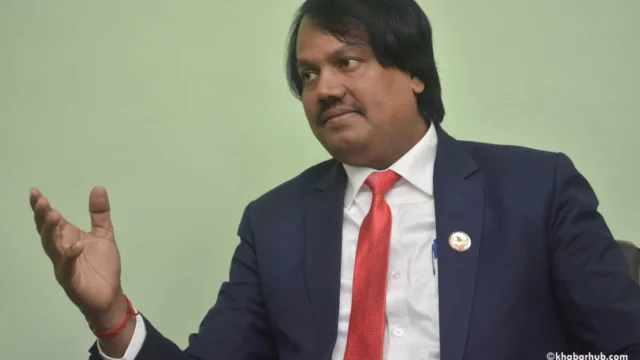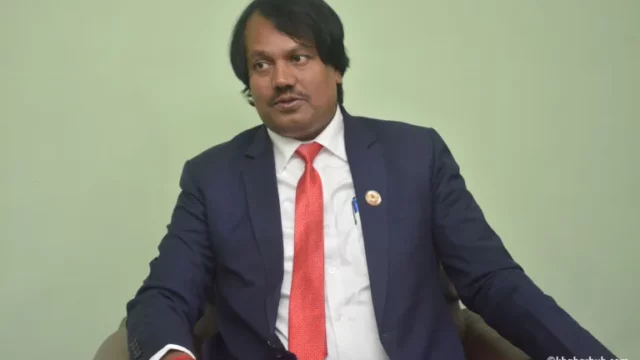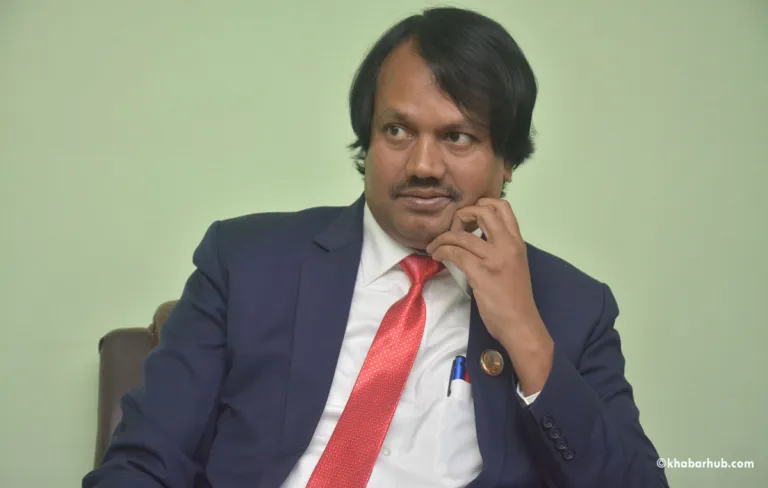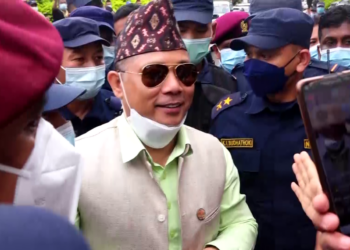KATHMANDU: Dr. CK Raut emerged victorious over Upendra Yadav from Saptari, securing a seat in the House of Representatives.
Returning from the United States after a 14-year stint, Raut, a fervent advocate for an autonomous Madhes, now directs his rebellious spirit toward parliamentary affairs, leading a national party with six seats and holding a ministerial position in the government.
In a conversation with Khabarhub, we delve into the multifaceted journey of CK Raut—from his radical past to his current political standing.
Along the way, we touch upon his distinctive long hair, his family dynamics, and the intriguing choice of embracing the Osho sect.
When discussing his political trajectory, CK Raut exhibits no remorse for his involvement in the ‘Free Madhes Movement.’
Reflecting on the unmaterialized formation of a separate Nepal, he attributes the prolonged political stalemate to a handful of leaders holding the nation hostage for three decades.
CK Raut provides insights into his views on prominent figures like Sher Bahadur Deuba, KP Oli, Pushpa Kamal Dahal Prachanda, Madhav Nepal, Rabi Lamichhane, Balendra Shah, and Harka Sampang.
Furthermore, we explore the potential unity of the Janamat Party with other Madhes-based political entities.
Drawing an analogy, CK Raut emphasizes the pivotal role of leadership, likening the nation to an airplane where skilled pilots and instructors are essential to prevent accidents.
Criticizing the dominance of a select few leaders, he contends that the country is currently under their hostage.
During an informal gathering at his party office in New Baneswar, CK Raut discusses ongoing initiatives and engages with Madhes activists in Kathmandu on a weekly basis.
This exclusive interview unveils the contemporary insights of Dr. CK Raut, the Chairman of the Janamat Party and a Member of the House of Representatives, offering a comprehensive perspective on his political metamorphosis.
Some people even refer to CK Raut as a ‘political thinker.’ In your opinion, what is the reason behind the lack of development in Nepal?
Well, you’ve started with quite profound question, and it might be challenging to cover everything in a brief discussion. However, I’ll touch upon three or four key factors.
First?
First and foremost, the dominance of four or five leaders in every facet of our system has hindered Nepal’s progress.
This pervasive influence has resulted in a mechanism where corruption often goes unchecked.
Actions that should benefit the nation end up being driven by personal gain through collusion. The crux of the matter is that a handful of leaders occupy every state system.
Second?
The issue of arbitrariness is prevalent. Be it in a company producing various products or actions in a hospital, there’s a lack of accountability.
Whether you’re an employee, doctor, engineer, politician, or businessman, a sense of arbitrariness prevails.
This extends to the public as well. Rumors can lead to violence, slogans during a procession can spark unrest, and this libertarian mindset has flourished in Nepal.
People’s grievances, even when fatal, often go unheard.
The mentality has shifted to a point where, if people seek compensation of 10 lakhs, there’s a belief that roads must be blocked, and vandalism must occur before any attention is paid.
This has become a significant hurdle in the country’s development, and there are numerous examples of such incidents.
Third?
Rapid pursuit of change without a thorough system check has been detrimental.
People rally behind a leader today, only to shift their support elsewhere in a month or two.
For any meaningful change, a long-term commitment and success are essential.
Unfortunately, this shift in mentality, where today’s agenda is quickly replaced by another in a matter of months, has led to a lack of consistency in attachment and desire.
This lack of uniformity poses a significant challenge to the country’s development.
Is it our political system that is bad or is it because of bad intentions of the leadership?
It seems that everyone’s intentions are good and should be.
However, there is a problem because personal interests often supersede political leadership.
It appears that most leaders are driven by a desire for financial benefits.
Some need it for personal life support, others for security, but beyond these individual needs, there is a pervasive issue with our leadership.
Some leaders have been accused of numerous murders, involved in large-scale corruption scandals, yet they seem to prioritize self-preservation over national development. Should the system be changed to build a better country?
The system itself is good for us, but there are certainly aspects that need improvement, and that’s why we’re voicing our concerns.
Take the example of our republican system and democracy – they are in excellent condition.
However, no matter how robust the system is, if the leaders lack integrity and dedication, accidents are bound to happen.
Our leaders, by and large, have failed to prioritize the well-being of the people.
Instead, the country has been held hostage by a few leaders for three to three and a half decades.

Can you name those four or five leaders who have held the country hostage?
The names are well-known. Everyone is aware.
Shifting to a personal matter, how did you, coming from a low-class family, manage to study in America and even secure a job at NASA?
It’s a personal passion. I had a childhood dream of becoming an engineer.
I pursued engineering in Kathmandu, aided by the state’s contribution through free education.
The state invested in my engineering studies, almost like providing it for free. I went from here to Japan, then to Cambridge, and eventually to America to work as a scientist at NASA.
What prompted your return to Nepal despite a successful career abroad?
While working in America, I traveled Mechi-Mahakali, which proved to be a life-changing experience.
The incidents in my village, the poverty, and the virtues here struck a chord.
Even as a successful scientist, the gap between my accomplishments and the needs of my people remained.
I couldn’t even install a water bore in my village without navigating through bureaucratic hurdles. This realization compelled me to step into politics.
You mentioned arranging accommodation for Kamaiya and Kamalari in Kanchanpur. Can you elaborate on that?
Yes, indeed. I had to find accommodation for Kamaiya and Kamalari in Kanchanpur, but I found myself unable to meet their needs adequately.
Despite being a scientist in America, I couldn’t fulfill the expectations of my own people.
This discrepancy pushed me back into politics, advocating for the changes that needed to be made.
How many years did you live abroad?
I stayed abroad for about 9-10 years.
Let’s delve into something personal. Why do you always wear a red tie and maintain long hair? Could you share the significance behind this hairstyle?
It’s not a big deal, but it holds symbolic value for me.
Long hair, in my view, symbolizes the nature of a rebel.
It’s a stance against conforming to societal norms that dictate short hair.
If you observe teenagers, you’ll notice that having long hair often aligns with a rebellious spirit.
It’s not a deliberate act; rather, it’s a symbol of rebellion.
The red tie, on the other hand, signifies sacrifice and is a symbol of revolution.
Why did you turn to Osho? Was it a desire or a compulsion?
Osho is my mentor. The worldview I’ve developed has been influenced by him, and I consider him my guide.
It wasn’t out of compulsion; it was a choice.
What’s the reason behind your meditation practice?
Meditation is about giving attention. Just as your body needs rest, your mind and soul also get tired from the demands of daily life and require rest. Meditation provides that rest for the soul.
How do you see yourself, as a Jogi (ascetic) or a leader?
People have multiple identities; it doesn’t have to be a singular label. It depends on the context.
If you allow, let’s touch on your family situation. Are you married or single?
I am married.
Do you have children?
Yes, I have three children. I’ve been married for 13 years. My eldest son is 12 years old, and the youngest is 6 years old.
After returning to Nepal from America, you entered politics with a new approach, advocating for the idea that Madhes should be made a separate country. What prompted this stance?
There were and are valid reasons. The discrimination against Madhes by the state amounts to what we consider colonial rule.
Madhes historically contributed two-thirds of the GDP and revenue by sector, yet it remained underdeveloped. Today, the consequences are evident.
If we take Karnali, it used to lag behind. However, now its literacy rate is 76 percent. On the other hand, Madhes, touted as the most accessible, has a literacy rate of 63 percent.
Similarly, Madhes lags behind in the Human Development Index and poverty index.
The underlying cause is Kathmandu’s historical neglect of developing towards Madhes.

Why did you withdraw from the ‘Free Madhes’ campaign? Do you believe it was a mistake?
Overall, the push for liberation was in response to the perceived colonial rule in Madhes rather than a singular agenda.
There seemed to be no alternative. The return of the people’s support made it challenging to operate.
We faced oppression from the state, despite their claims of democracy. Social work was restricted, and I was even put under house arrest.
Due to these constraints, we shifted our focus to mainstream development.
There’s a tendency to blame foreigners for issues in the country. Do you think that foreign influences are solely responsible for Madhes’ current situation?
We have a habit of accusing foreigners for our problems without introspection.
Was Madhes prosperous yesterday, and is it now a monster due to foreign influence?
It is the state that perpetuates illiteracy among the people. It fails to acknowledge its own shortcomings.
The understanding is growing, not only among the people but also among the hilly and marginalized classes.
The concept of an ‘independent Madhes’ was initiated during your time in America. Can you shed light on who influenced you to start this campaign?
It’s been 12 years since this matter was brought up. In those 12 years, what did they find against me?
I was put under house arrest, subjected to the strictest investigations, and there was a nationwide mechanism to scrutinize everything, from papers to emails.
In all this time, they could not present a single piece of evidence that I operated from abroad.
If I were indeed operating from a foreign country, it would have surfaced prominently.
But it never did, unlike other individuals. If there was evidence, it would have come to light.
Yet, nothing. I am someone who returned after witnessing the plight here, having come to a realization on my own.
Now, you are actively involved in mainstream politics by establishing the Janmat Party, which holds 6 seats in the House of Representatives. How does your party differ from JSP led by Upendra Yadav?
We are fundamentally different. Our basis is distinct. We are not professional politicians engaged in a politics of inheritance, where family members take turns holding positions.
We entered politics not because the situation in the country was ideal but to contribute to its improvement.
Many join politics out of unemployment or due to family ties with previous leaders.
We are not such individuals. We weren’t part of any party during that movement, and our goal was not to become parliamentarians or ministers.
We took risks and entered politics driven by a desire to bring positive change. Our motivation stems from a genuine concern for the country, not for personal position or prestige.
Despite becoming parliamentarians, I chose not to become a minister.
Other party presidents did, but I didn’t enter politics with the aim of securing a ministerial post. It’s not my priority.
I didn’t come for personal gains; that’s a different matter.
Is Janmat Party a new version of JSP and LSP, or do you have a distinct political agenda?
While there are some overlapping agendas, such as republicanism and federalism, Janamat Party sets itself apart in specific areas.
We actively advocate for employment, jobs, and industry, a cause not emphasized by other parties.
We consistently rally against corruption, urging investigations and actions even within the provincial and Madhes governments. We demand good governance and actively protest for it.
Additionally, we have established a brotherly organization to advocate for farmers, a cause not commonly championed by other parties.
Our focus is on representing and fighting for the marginalized class. I didn’t strive for power; my goal was to address the needs and struggles of the people.
How would you categorize the Janmat Party – as a nationalist or Madhes-based party?
I would call it a national party rather than a nationalist party.
In Nepal, hollow nationalism exists, and those who vocally claim to be nationalists often fall short in their actions.
The loudest shouters are the ones who surrender first.
You contested the 2079 BS election from Saptari against Upendra Yadav and won. Even in the by-election, you nominated a candidate from Bara against Upendra Yadav. Could you explain the reasons behind your disagreement with him?
Have you ever heard me speak negatively about him? I have consistently expressed my ‘appreciation’ for him.
While perceptions from the outside might differ, I’ve always appreciated his contributions.
In fact, I honored him in my first speech in Parliament, explicitly mentioning his name. My respect for him has been consistent.
What led to your decision to run against Upendra Yadav in the by-election, considering your prior agreement not to contest from the same place?
After offering my candidacy in one place, people interpreted it as competition.
However, my house is there, so what choice did I have? He would naturally rise from his own constituency.
We initially had an agreement not to contest from the same place, but he later deviated from that agreement.
Is there a current leader whom you consider as your idol?
I cannot single out anyone at the moment.
How do you perceive UML President KP Sharma Oli?
Every leader has merits and demerits. I don’t see any leader as an ideal.
Prachanda has some commendable qualities, Sher Bahadur has a democratic culture, and Oli brings visionary programs, like constructing roads, hospitals, and view towers across constituencies.
What are your thoughts on Prachanda?
Prachanda, having come through a revolution, possesses great leadership and association-making abilities. Whether these are used in the right direction is subjective.
How about Madhav Kumar Nepal?
I haven’t had extensive interaction with Madhav Nepal, but he seems knowledgeable.
It appears that he is a leader capable of organizational development and in-depth study.
What’s your opinion on Rabi Lamichhane?
I have high hopes for Rabi Lamichhane. He brings positive energy wherever he goes, and I wish him the best.
What are your thoughts on Kathmandu Mayor Balendra Shah?
I feel positive about him. He represents the hopes of the youth, although I haven’t personally met him.
And Harka Sampang, the mayor of Dharan sub-metropolitan city?
He is doing well in his role.
Why didn’t you name any leader from Nepal as your political ideal?
It’s not that there are no inspiring personalities within the country.
My political ideology is somewhat influenced by figures like Gandhi.
Nelson Mandela and Mahatma Gandhi were role models before the formation of our party, and we’ve moved forward following Gandhi’s principles.
Where do you see the position of Janmat Party in 2084 BS?
It will undoubtedly grow. We have experienced significant growth since the 2079 BS elections, and people have witnessed the formation of a national party.
The positive trajectory continues.









Comment